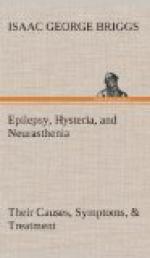In this state, an appropriate suggestion must be made, sincerely, and with absolute faith in its power. Christ’s miracles were the result of suggestive therapeutics, and He took care to inspire relatives with faith, to exclude scoffers, to surround himself by his believing Apostles, and, after treatment, said: “See thou tell no man!” well knowing that suggestion cannot withstand derision.
In this way, a patient of limited means can do for himself exactly what more fortunate ones pay large fees to specialists to do for them. The treatment is uncommon, but sound, for the medical profession is perhaps the most conservative on earth, and when specialists of repute use a method, you may be confident it is of value.
To cure sleeplessness, see that stomach and brain are at rest, bed comfortable, and feet warm; calm yourself, and focus on the idea of sleep, saying:
“I shall go to sleep in a few minutes, and wake at eight o’clock in the morning.”
Repeat this a few times, persist for a few nights and you will quickly get drowsy, and fall asleep.
Phrases for other requirements will readily occur, as:
“I shall feel confident in open spaces!”
“I shall find no more pleasure in alcohol!” and so on.
Suggestion will not cure epilepsy, hysteria or neurasthenia, but it overcomes many of the symptoms which make the patient so wretched.
“Crutches are hung on
the walls of miraculous grottos, but never a
wooden leg.”
Suggestion may move a paralysed arm, but the muscles only become healthy again in many days by slow repair; suggestion releases the catch, but the spring must be wound up by energy suitably applied.
* * * * *
CHAPTER XIX
MEDICINES
“Of simples in these groves
that grow
He’ll learn the perfect skill;
The nature of each herb, to know
Which cures and which can kill.”
—Dryden.
So distressing a malady as epilepsy early attracted attention, and every treatment superstition could devise, or science could suggest, has been tried. Culpepper in his “Herbal” (300 years old), recommends bryony; lunar caustic (nitrate of silver) was extensively used, because silver was the colour of the moon, which caused madness.
The royal touch for scrofula (King’s Evil) was also extended to epilepsy, the king blessing a ring, which was worn by the sufferer.
Another old remedy was to cut off a lock of the victim’s hair while in a seizure and put it in his hand, which stopped (?) the attack. In Berkshire a piece of silver collected at the communion service and made into a ring was specific, but in Devon a ring made of three nails from an old coffin was preferred. Lupton says: “A piece of child’s navel-string borne in a ring is good against falling sickness.”




